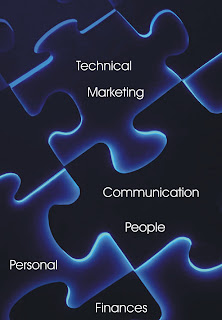 Sonia Colon offers the six essential skills to business success. Sonia says you may not have developed all of these skills, but like most things in life, you can by learning, practicing and determination. Implement them and you’ll be on the right track.
Sonia Colon offers the six essential skills to business success. Sonia says you may not have developed all of these skills, but like most things in life, you can by learning, practicing and determination. Implement them and you’ll be on the right track.1. Personal Skills
A healthy self esteem is necessary for you to tackle the day to day tasks of business. As an entrepreneur, you will spend a great deal of time working solo. Listen to your heart but consult your head before making final business decisions. Keep motivated by staying on track of plans and organization.
2. Communication Skills
You must sharpen your communication skills if they have become a little rusty. You may find yourself needing to communicate with lawyers, accountants, bank managers etc. You need to be able to get your message across clearly. Good communication will reduce the chance of being misunderstood. It’s essential to be able to communicate effectively at a variety of levels, in a variety of manners, to a variety of people. There are many self-help books on this topic.
3. People Skills
People will make or break your business. You will make or break your business. You are Your business. The way you deal with people will determine much of you business success. Good manners, politeness, and attentiveness to your customers’ needs are what will ensure repeat business. Customers need to feel that they are important to you.
4. Marketing Skills
To round off your entrepreneurial skills, you will have to have a sound knowledge of marketing your business. Marketing is the ability to communicate to your potential customers and inform them of your products and or services. Know how to define and target your market. You need to know what will work for your business. Read books, talk to others and observe how other types of businesses successfully market their businesses. Usually effective marketing involves a combination of many techniques that can change from time to time.
5. Technical Skills
Read books, attend seminars, workshops, trade shows and conferences to add to your technical knowledge and keep a leading edge on your competition. Don’t make the mistake of working at your business and forget to work on your business. Never cease your education in your area of expertise, and remember to keep up with the changing technology within your chosen field.
6. Financial Skills
You have to be financially knowledgeable in the business world. Your entrepreneurial knowledge should include basic accounting, organizational and administrative skills, an understanding of all tax laws, federal and provincial requirements, and an in-depth knowledge of the business that you are running.
It may sound like a lot to learn, but take heart. You can learn everything you need to know to run a successful business. No one was born a business HOT-SHOT. There are an abundance of courses offering business management training. There are also self-help books that can assist you with the financial aspects of your business needs.
Sonia Colon is writer/publisher of My Fashion E-Mall Blog & The Biz Buzz of a Latina Mom Blog! Writing & sharing powerful business articles & successful Internet marketing tips on starting & maintaining a lucrative work-at-home business is a passion.
